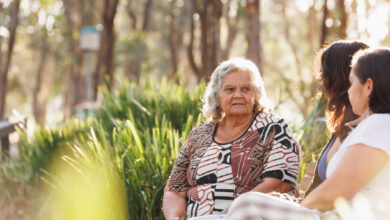Not enough allied care workers to meet aged care standards

More than 25,000 health professionals would be needed to meet the explosive demand for aged care workers as the Australian population grows and ages.
The 2021 Aged Care Royal Commission report described the sector as a "cruel and harmful system" that subjected older Australians to poor care, abuse, and neglect.
Despite the government having improved the system with 24/7 nurses, the 15 per cent wage increase, and new nutrition programs, Australians in aged care are receiving an average of eight minutes of allied health care each day – falling incredibly short of the 22 minutes recommended.
With the recent Intergenerational Report expecting the population of older Australians to triple in size, the sector is raising alarms over the predicted shortfall.
Deputy chair of the Australian Council of Deans of Health Sciences (ACDHS), Terry Haines, said training would need to start today.
"To achieve the 22 minutes a day by 2033, Australia would need to train another 25,000 allied health professionals," Mr Haines said.
"Due to the high demand, obstacles to supply, and the overall time required to increase the number, the training would need to start today."
To achieve the 25,000 professionals, the number of graduates and allied healthcare training places would need to triple from the current 10,000 offered each year.
Even then, Mr Haines questioned if the minimum 22 minutes was enough.
"If we were to say that 30 minutes of allied health care a day is better, we'd need to scale up to training an additional 38,000 allied health professionals over the next decade to work in the aged care sector," he said.
"Either goal is a massive task for the tertiary sector to undertake, and we need to be planning for it, preparing for it, and working with the government to realise it now."
A survey by the Royal Australian College of General Practitioners (RACGP) found that over half of the sector's workers were planning to leave in the next three years due to working conditions – with one in eight allied health workers losing employment and another 30 per cent leaving due to cut hours.
Mr Haines is now calling on the government to declare if it will back the recommendation of 22 minutes of allied health care a day.
"If the government is not willing to back that benchmark, then they will need to back research to understand what level of allied health in aged care is adequate to deliver care to residents and prevent an undue burden on the wider health system."
Email: [email protected]






Paying better wagers to allied health residential and community workers would help – weren’t considered direct workers and didn’t receive the 15% wage increase – not much incentive to keep working in this area when not valued or recognised as a direct worker
The questions should be asked of each provider & collated to tell a story:
What is the ratio of Home Care workers against the rate of accepting new HCP recipients? (consider – accepting new clients without the staff to service them).
What effort is afforded to finding well trained staff? Advertising? Websites? Incentives for staff & recipients to inform their community of who manages their Packages?
What are the staff turnovers & why? Why do recipients move to other Providers?
A whole new look must be aired of what it’s really like at the “coal face”, and only workers & recipients can give that information. Not those in management roles.